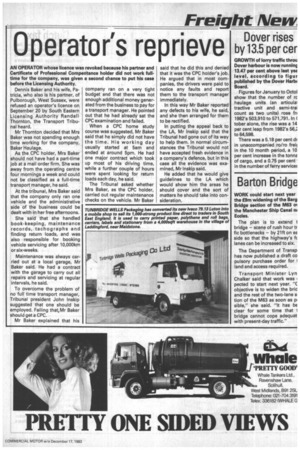Operator's reprieve
Page 15

If you've noticed an error in this article please click here to report it so we can fix it.
AN OPERATOR whose licence was revoked because his partner and Certificate of Professional Comperitance holder did not work fulltime for the company, was given a second chance to put his case before the Licensing Authority.
Dennis Baker and his wife, Patricia, who also is his partner, of Pulborough, West Sussex, were refused an operator's licence on September 20 by South Eastern Licensing Authority Randall. Thornton, the Transport Tribunal heard.
Mr Thornton decided that Mrs Baker was not spending enough time working for the company, Baker Haulage.
As the CPC holder, Mrs Baker should not have had a part-time job at a mail order firm. She was away from the operating centre four mornings a week and could not be classified as a full-time transport manager, he said.
At the tribunal, Mrs Baker said that the company only ran one vehicle and the administrative side of the business could be dealt with in her free afternoons.
She said that she handled book-keeping, maintenance records, tachographs and finding return loads, and was also responsible for booking vehicle servicing after 10,000km or six-weeks.
Maintenance was always carried out at a local garage, Mr Baker said. He had a contract with the garage to carry out all repairs and servicing at regular intervals, he said.
To overcome the problem of no full time transport manager, Tribunal president John Inskip suggested that one should be employed. Failing that, Mr Baker should get a CPC.
Mr Baker explained that his company ran on a very tight budget and that there was not enough additional money generated from the business to pay for a transport manager. He pointed out that he had already sat the CPC examination and failed.
When a CPC home study course was suggested, Mr Baker said that he simply did not have the time. His working day usually started at 5am and ended at around 5pm. He had one major contract which took up most of his driving time, while a further couple of hours were spent looking for return loads each day, he said.
The Tribunal asked whether Mrs Baker, as the CPC holder, carried out regular maintenance checks on the vehicle. Mr Baker said that he did this and denied that it was the CPC holder's job. He argued that in most companies, the drivers were paid to notice any faults and report them to the transport manager immediately.
In this way Mr Baker reported any defects to his wife, he said, and she then arranged for them to be rectified.
In putting the appeal back to the LA, Mr Inskip said that the Tribunal had gone out of its way to help them. In normal circumstances the Tribunal would not have accepted fresh evidence in a company's defence, but in this case all the evidence was examined, Mr inskip said.
He added that he would give guidelines to the LA which would show him the areas he should cover and the sort of matters he should take into consideration.












































































